Home » Frequently Asked Questions
Please select a category below to filter our frequently asked questions

A magnetic resonance imaging (MRI) test and a computerized tomography (CT) scan are both types of imaging studies that give your doctor an insider’s view of your body. Both types...
More: MRI vs. CT Scan »

Yes, some people can recover from a traumatic brain injury, but they might face a lifetime of problems. A traumatic brain injury (TBI) can range in severity from a mild...
More: Can You Recover From a Traumatic Brain Injury? »

Most brain and spinal cord injury lawyers do not receive any attorney’s fees unless the firm can recover compensation for the client. The firm receives the payout following a settlement...
More: How Does a Brain and Spinal Cord Injury Lawyer Get Paid? »

The Centers for Disease Control and Prevention reported more than 2.8 million traumatic brain injuries in the United States in 2014. If you or a loved one suffered brain and...
More: How Can a Brain and Spinal Cord Injury Lawyer Help Me? »

Paralysis happens when an injury or illness causes damage to the brain, the spinal cord, or the nerves at the end of the spinal cord. Spinal cord injury and stroke...
More: How Does Paralysis Happen? »

Fluid on the brain (hydrocephalus) can be detected via a long laundry list of signs and symptoms, however, a diagnosis can only be made from a neurological exam, brain imaging...
More: How Do I Know If I Have Fluid on My Brain? »

There is no cure for paralysis. However, a patient can regain some or even all of their sensory function and motor control when the cause of the paralysis is treated....
More: Is There a Cure For Paralysis? »

Your brain must have a constant flow of blood to perform its functions and stay alive, but problems can arise when blood is in the wrong areas of the brain....
More: How Do I Know If I Have Blood in My Brain? »

Blood clots are diagnosed in different ways depending on your symptoms and medical history. A blood clot that forms in a vein residing deep in your body (deep vein thrombosis)...
More: How Are Blood Clots Diagnosed? »

Most states now have “Good Samaritan” drug overdose legislation that gives some legal protection to bystanders who call for medical assistance for people who are overdosing. In the past, people...
More: What Is The Good Samaritan Drug Overdose Act? »

President Reagan signed the Anti-Drug Abuse Act of 1986, also called the “Len Bias Law.” Len Bias was an NBA player who died from cardiac arrhythmia induced by a cocaine...
More: What Is The Len Bias Law? »

Most states now have “Good Samaritan” drug overdose legislation that gives some legal protection to bystanders who call for medical assistance for people who are overdosing. In the past, people...
More: What Is The Good Samaritan Drug Overdose Act? »

We do not know how many patients die in treatment centers from substance abuse brain injuries and disorders because the government does not keep track of deaths in treatment centers....
More: How Many Patients Die in Treatment Centers from Substance Abuse Brain Injuries? »

Alcohol poisoning, also called alcohol overdose, occurs when there is too much alcohol in the bloodstream for the brain to adequately control the functions that support life. Some examples of...
More: How is the Brain Affected by Alcohol Poisoning? »

The signs and symptoms of benzodiazepine addiction include: Fatigue and weakness Sluggish thoughts and reflexes Urgency, irritability, and spontaneous mood swings Asking friends and family members for benzos Asking your...
More: What Are the Signs and Symptoms of Benzodiazepine Addiction? »

The term “benzo” refers to a class of drugs containing benzodiazepine, a Schedule IV substance that is intended to be prescribed as a sedative to treat muscle spasms, anxiety, seizures,...
More: What Happens to the Brain During Benzo Withdrawal? »

Strokes are one of the most common causes of locked-in syndrome. These strokes affect the brain stem. Doctors often call them pontine strokes because they specifically affect an area of...
More: What Is Locked-In Stroke? »
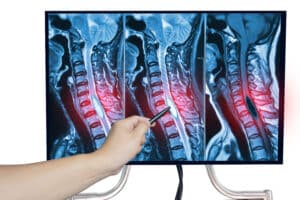
When an accident or other injury severs the spinal cord, it causes a complete spinal cord injury. This cuts off all communication between the brain and the body below the...
More: What Happens To The Spinal Cord When It Is Severed? »

A “minimally conscious state” means someone appears to be unconscious or in a significantly altered state but makes purposeful movements or demonstrates awareness. This type of communication or reaction may...
More: What Does "Minimally Conscious State" Mean? »

Because it causes near-global paralysis, takes away the ability to speak, and prevents a person from providing self-care, locked-in syndrome affects almost every aspect of a person’s life. Most people...
More: How Does Locked-In Syndrome Affect the Person's Life? »

Locked-in syndrome is the outcome when an injury to the brain stem prevents the brain from communicating with the spinal cord and the rest of the nervous system. Most commonly,...
More: How Does Locked-In Syndrome Affect the Nervous System? »

Doctors can run a series of tests to rule out other conditions and determine brain function to confirm a locked-in syndrome diagnosis. Diagnosing this condition is often difficult, and could...
More: How Do Doctors Make a Diagnosis of Locked-In Syndrome? »

Some people diagnosed with locked-in syndrome continue to feel pain and retain sensation throughout their body or in limited areas of their body. Every case of locked-in syndrome is different,...
More: Do People With Locked-In Syndrome Feel Pain? »

A lightning strike can cause brain damage by affecting the function of the central nervous system, motor neurons, and peripheral nerves. Lightning can also cause the heart to stop, cutting...
More: Lightning Strike Acquired Brain Injury »

A heart attack can cause an acquired brain injury in a matter of a few minutes. When the heart stops or changes to a rhythm that will not support adequate...
More: Heart Attack Acquired Brain Injury »

Head and neck trauma can cause an acquired brain injury (ABI) in a number of ways. From a direct blow to the head to a hypoxic injury, the trauma can...
More: Head and Neck Trauma Acquired Brain Injury »
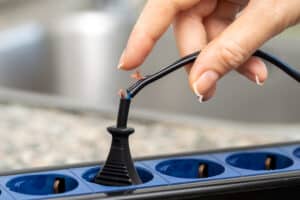
An electrical shock can lead to an acquired brain injury (ABI) in two different ways. The initial jolt of electricity to the body can affect the central nervous system, motor...
More: Electrical Shock Acquired Brain Injury »
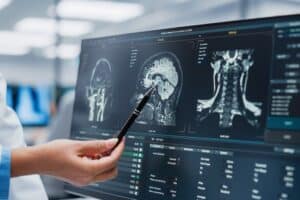
A crushed chest can cause a hypoxic brain injury, meaning there was a disruption in the oxygen available to the brain. This is a type of acquired brain injury, also...
More: Crushed Chest Acquired Brain Injury »
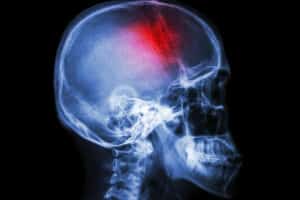
An arteriovenous malformation (AVM) is a tangle of abnormal blood vessels. Usually present at birth, an arteriovenous malformation can occur anywhere in the body. When they occur in the brain...
More: Can Arteriovenous Malformation Cause Acquired Brain Injury? »

If you or a loved one suffered an artery impingement that led to an acquired brain injury, our attorneys at Newsome | Melton can help. When arteries suffer damage, they...
More: Artery Impingement Acquired Brain Injury »

A broken back involving the spinal cord can paralyze you for life, cutting off communication between the brain and the body below the level of injury. This can limit or...
More: Can A Broken Back Paralyze You For Life? »

A cervical spine injury affects the top part of the spine, from the base of the skull to the upper back. The neck has seven cervical vertebrae, known as C1...
More: What Is A Cervical Spine Injury? »

The symptoms of a neck injury can vary depending on the type of injury, how serious it is, and whether the injury affected the spinal cord. Pain and swelling are...
More: What Are The Symptoms Of A Neck Injury? »
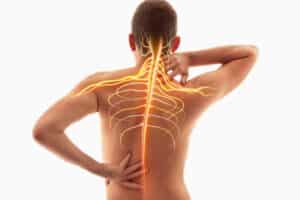
The most common cause of altered function of the spinal cord is a complete or incomplete spinal cord injury. Most injuries occur during traumatic accidents, often in car crashes or...
More: What Are The Most Common Causes Of Altered Function Of The Spinal Cord? »
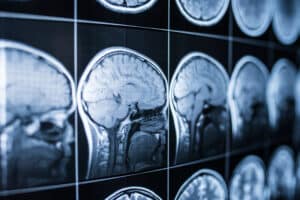
Seizure disorders can cause acquired brain injury (ABI). There is a close correlation between seizure disorders and traumatic brain injury or other brain disorders. Disorders such as epilepsy can cause...
More: Seizure Disorders Acquired Brain Injury »

How doctors treat broken vertebrae depends on the type of injury, the cause, its location, and many other factors. Treatment can range from conservative treatment — e.g., bracing — to...
More: What Do Doctors Do For Broken Vertebrae? »
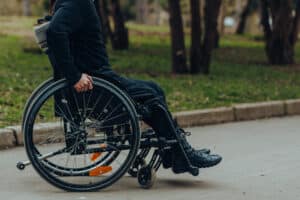
Several factors determine the level of paralysis, including: Where the injury occurred Whether the injury was complete or incomplete When the spinal cord sustains damage, the victim often suffers total...
More: What Determines The Level Of Paralysis? »

The effects of an injury to the first thoracic vertebrae, often from a car accident or other trauma, can be lasting and significant. Located near the top rib, an injury...
More: What Are The Effects Of An Injury To The First Thoracic Vertebrae? »
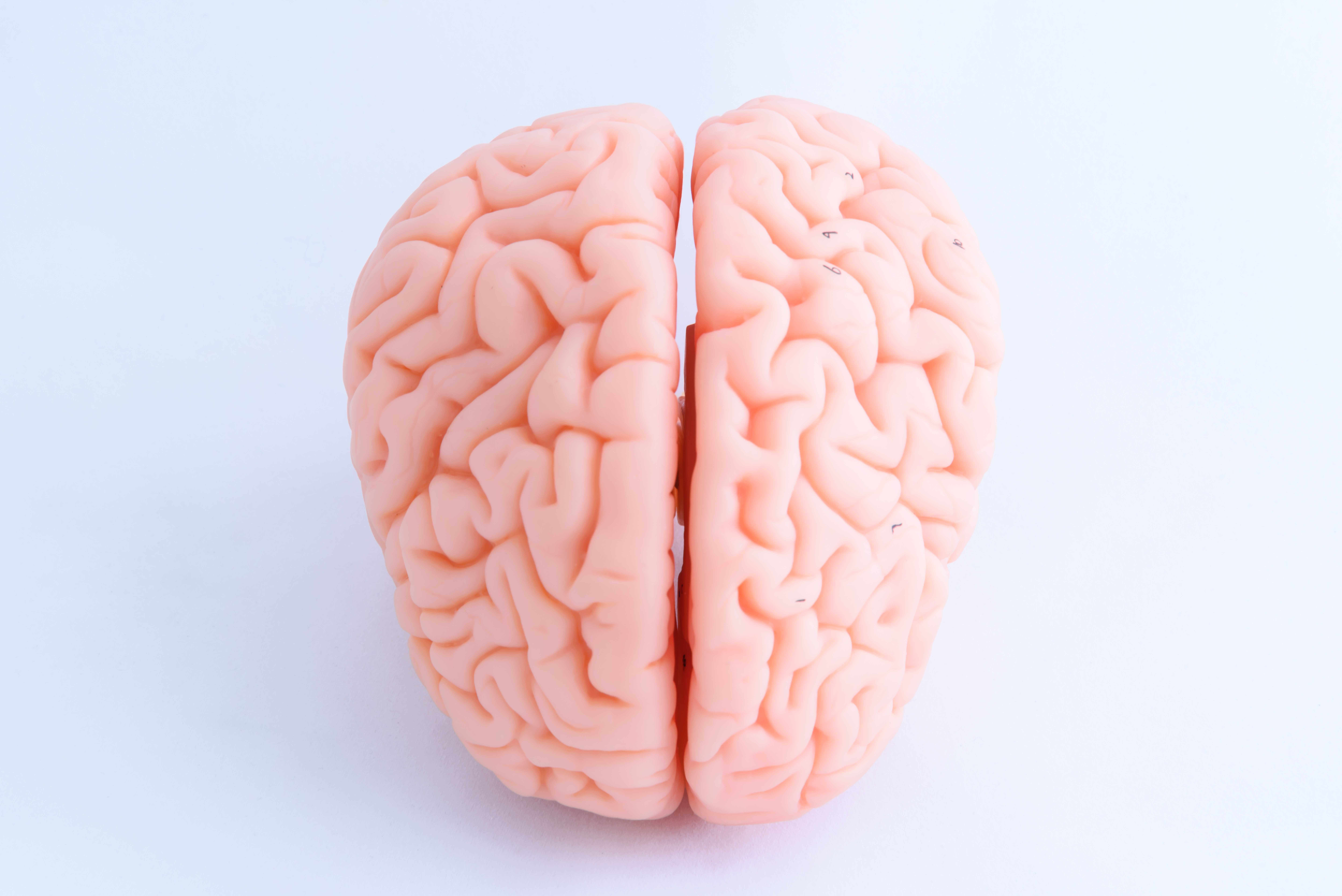 Toxic Exposures to Chemicals and Gases Acquired Brain Injury
Toxic Exposures to Chemicals and Gases Acquired Brain Injury
Exposure to toxic chemicals and gases is one of the most common causes of acquired brain injuries (ABI). A quick diagnosis, limiting exposure, and treatment helps many people recover from...
More: Toxic Exposures to Chemicals and Gases Acquired Brain Injury »

Both hypoglycemia and hyperglycemia can cause brain injury. However, the way these two conditions cause neurological damage does differ. In general, hypoglycemia (low blood sugar) is much more dangerous. Extremely...
More: Hypoglycemia or Hyperglycemia Acquired Brain Injury »
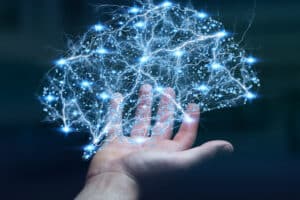
Damage to the brain on a cellular level occurs during a concussion or other type of head injury. This irreversible damage does not occur immediately after an accident or incident...
More: Cellular Level Brain Damage »
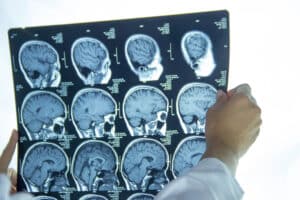
There are two sub-types of brain injury: open and closed. Both can be devastating and leave the victim suffering significant impairments. In general, the brain injury from an open wound...
More: Brain Injury Sub-Types »

There are three levels of brain injury, classified based on severity. These levels include: Mild Moderate Severe Doctors use a special scale called the Glasgow Coma Scale to determine the...
More: Brain Injury Levels »

Uremic encephalopathy (UE) can cause acquired brain injury. The condition is one of the common causes of acquired brain injury. Uremic encephalopathy is a complication of renal failure that leads...
More: Uremic Encephalopathy Acquired Brain Injury »

In most cases, those who receive a locked-in syndrome diagnosis retain full cognitive functioning. Locked-in syndrome occurs because of a stroke or other issues in the brain stem. This is...
More: Do You Lose Any Cognitive Functions With Locked-In Syndrome? »

In some cases, patients who have an incomplete form of locked-in syndrome may regain the ability to live functionally. Studies of patients with locked-in syndrome show that those with the...
More: Can You Live Functionally With An Incomplete Form Of Locked-In Syndrome? »

Patients with locked-in syndrome can hear you and may be able to respond. He or she typically has global paralysis, except for blinking and vertical eye movements. Some can answer...
More: Can You Communicate With Someone With Locked-In Syndrome? »

The area of the brain that can cause locked-in syndrome (the pons) following a stroke is the same area of the brain that regulates pace and depth of autonomic breathing....
More: Why Is There A Danger Of Pulmonary Complications With Locked In Syndrome? »

Many patients die in the first hours or days following a brain stem or pontine stroke, often of pulmonary complications. Others are not diagnosed soon enough and die from the...
More: What Are The Chances Of Living After A Locked In Syndrome Diagnosis? »

There are three different types, called categories, of locked in syndrome. When doctors diagnose someone with the condition, the medical professional will evaluate their abilities and impairments to determine which...
More: Are There Different Types Of Locked In Syndrome? »
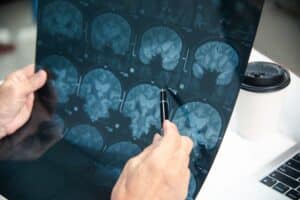
The pons is a small but vital brain structure that houses bunches of nerve fibers. These fibers connect both the cerebrum and the cerebellum as well as the right and...
More: What Is The Main Function Of The Pons In Your Brain? »

Being conscious but paralyzed can be extremely scary at first, but with treatment and support, many people in this situation can retain a relatively high quality of life. When someone...
More: What Is It Like To Be Conscious But Paralyzed? »

If you or a loved one have symptoms that may indicate you are having a stroke, the doctor should order some imaging scan. This often includes magnetic resonance imaging (MRI),...
More: How Does A Doctor Diagnose A Brain Stem Stroke? »

The warning signs for a brain stem stroke can appear very similar to the symptoms of a stroke affecting other parts of the brain. Vertigo, dizziness, and lack of coordination...
More: Are There Warning Signs For A Brain Stem Stroke? »

A traumatic brain injury, stroke, or hemorrhage that affects the brain stem can lead to locked in syndrome while similar injuries to other parts of the brain can instead cause...
More: Are People With Locked In Syndrome Locked In A Vegetative State? »

Most cases of locked in syndrome occur because of damage to the brainstem. The brainstem is near the base of the skull, connecting the cerebrum with the spinal cord. It...
More: What Area Of The Brain Causes Locked In Syndrome? »

There are no warning signs for locked-in syndrome. The only signs that someone may have locked-in syndrome include waking from a coma but remaining paralyzed and unable to communicate. Locked-in...
More: Are There Any Warning Signs For Locked In Syndrome? »
 Can Insect-Carried Diseases Cause Acquired Brain Injury?
Can Insect-Carried Diseases Cause Acquired Brain Injury?
Some insect-carried diseases cause patients to suffer an acquired brain injury (ABI). In some cases, this can happen within hours of the first symptoms of the illness. The brain injuries...
More: Can Insect-Carried Diseases Cause Acquired Brain Injury? »

Physical violence can cause traumatic brain injuries (TBIs). This kind of violence could include assault, domestic violence, or other similar situations including punches, kicks, or shoves to head or actions...
More: Can Physical Violence Cause Traumatic Brain Injury? »

Yes, firearms can cause traumatic brain injuries and leave shooting victims fighting for their lives, not to mention cause lifelong medical issues. Because a bullet can penetrate and damage so...
More: Can Firearms Cause Traumatic Brain Injury? »

An arteriovenous malformation (AVM) is a tangle of abnormal blood vessels. Usually present at birth, an arteriovenous malformation can occur anywhere in the body. When they occur in the brain...
More: Can Arteriovenous Malformation Cause Acquired Brain Injury? »
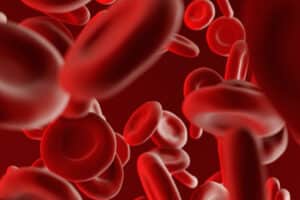
If you or a loved one suffered an artery impingement that led to an acquired brain injury, our attorneys at Newsome | Melton can help. When arteries suffer damage, they...
More: Artery Impingement Acquired Brain Injury »

Locked in syndrome affects motor function, but pain may be possible in some cases. Most people with the condition describe feeling scared and anxious early on, but once they develop...
More: What Does Locked In Syndrome Feel Like? »

There is no cure for locked in syndrome, and most treatments focus on preventing further issues — bedsores and pneumonia, for example — and improving quality of life. Most people...
More: Is There A Cure Or Treatment For Locked In Syndrome? »

There are no exact numbers on how many people are diagnosed with locked-in syndrome each year. However, it is an extremely rare condition. There are only a handful of known...
More: How Many People Are Diagnosed With Locked-in Syndrome Each Year? »

While there are occasionally cases that make the news of someone recovering from locked-in syndrome or a similar diagnosis, this is incredibly rare. Most people diagnosed with this condition do...
More: Are The Effects Of Locked In Syndrome Permanent Or Is It Reversible? »

Locked in syndrome can occur from any injury or illness that results in both quadriplegia and the inability to communicate verbally but does not affect the person’s cognitive functioning. In...
More: What Are The Causes Of Locked In Syndrome? »

Locked in syndrome is not common. In fact, it’s an extremely rare condition with fewer than one case diagnosed per million people. Locked in syndrome leaves the person with an...
More: Is Locked In Syndrome Common? »

Intracranial tumors — cancerous or noncancerous tumors growing in the brain — can cause an acquired brain injury (ABI). Tumors can kill surrounding brain cells as they grow. The damage...
More: Can Intracranial Tumors Cause Acquired Brain Injury? »

Systemic infections can leave you with a serious acquired brain injury (ABI). Initially mild infections can escalate in severity without proper treatment. For example, a sinus infection can cause a...
More: Can Infectious Diseases Cause Acquired Brain Injury? »

Any vascular injury or issue causing a disruption in the blood flow to the brain can lead to an acquired brain injury (ABI). The brain requires a constant supply of...
More: Can Vascular Disruption Cause Acquired Brain Injury? »
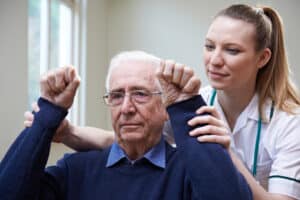
Strokes are a common non-traumatic cause of acquired brain injuries. When someone has a stroke, there is a blockage in the large blood vessels of the neck. This can happen...
More: Can Stroke Cause Acquired Brain Injury? »

A serious injury or violent act can cause significant blood loss, which can, in turn, precipitate an acquired brain injury. When blood volume drops significantly, oxygen-rich blood cannot reach the...
More: Can Blood Loss Cause Acquired Brain Injury? »

Airway obstruction can cause acquired brain injury by stopping breathing and preventing oxygen from getting to the brain. Without oxygen, neural cells begin to die. This causes brain damage in...
More: Can Airway Obstruction Cause Acquired Brain Injury? »

Choking can cause an acquired brain injury (ABI). When something becomes lodged in your throat and cuts off your ability to breathe, this also limits or cuts off the oxygen...
More: Can Choking Cause Acquired Brain Injury? »

Venereal diseases (i.e., sexually transmitted diseases or STDs) can cause serious acquired brain injuries (ABIs) in some cases. Not every STD can affect the brain and cause damage, and many...
More: Can Venereal Diseases Cause Acquired Brain Injury? »

Going into shock can cause an acquired brain injury by reducing the amount of oxygen-rich blood that reaches the brain. Without blood and oxygen, the brain quickly begins deteriorating. Neural...
More: Can Shock Cause Acquired Brain Injury? »
 Can Metabolic Disorders Cause Acquired Brain Injury?
Can Metabolic Disorders Cause Acquired Brain Injury?
Metabolic disorders can cause an acquired brain injury (ABI) when waste products build up in the brain. A brain injury caused by metabolic disorders can begin after birth and continue...
More: Can Metabolic Disorders Cause Acquired Brain Injury? »

Meningitis can cause an acquired brain injury (ABI). Most cases of meningitis are caused by viruses or bacteria. Meningitis affects the meninges, the protective membranes of the nervous system. When...
More: Can Meningitis Cause Acquired Brain Injury? »
 Can Hepatic Encephalopathy Cause Acquired Brain Injury?
Can Hepatic Encephalopathy Cause Acquired Brain Injury?
Hepatic encephalopathy is a type of brain damage that occurs because of problems with the liver. Liver failure or liver disease can affect the filtering ability of the body, and...
More: Can Hepatic Encephalopathy Cause Acquired Brain Injury? »

HIV and AIDS can cause neurological damage in several ways, leading to brain damage. Keeping your viral load under control by taking and remaining on medication is the best way...
More: Can AIDS Cause Acquired Brain Injury? »

Acquired brain injury (ABI) is any type of brain injury not caused by a genetic condition or another congenital abnormality. An ABI can occur because of an accident or illness....
More: What Is Acquired Brain Injury? »
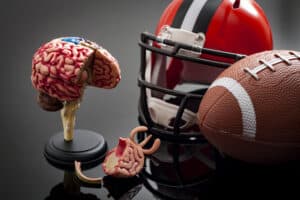
Yes, sports can cause a traumatic brain injury. Many people suffer traumatic brain injuries (TBIs) while playing in games, practicing a sport, or engaging in other recreational activities related to...
More: Can Sports Cause Traumatic Brain Injury? »

Near drowning can cause acquired brain injury (ABI). Near drowning occurs when water enters your lungs and you stop breathing. Your brain does not get the oxygen it needs, and...
More: Can Near Drowning Cause Acquired Brain Injury? »

Yes, a fall can cause a traumatic brain injury (TBI). According to data published by the Centers for Disease Control and Prevention, in 2013, falls were the top cause of...
More: Can a Fall Cause Traumatic Brain Injury? »

A traumatic brain injury (TBI) occurs when there is a “bump, blow, or jolt to the head” that causes issues with the functions of the brain, according to the Centers...
More: TBI Traumatic Brain Injury »

Yes, a car crash can cause a traumatic brain injury (TBI) in many ways. In fact, according to the Centers for Disease Control and Prevention (CDC), motor vehicle accidents were...
More: Car Crash Traumatic Brain Injury »

